Three of the most exciting fashion labels for 2024 are helmed by women whose determination is as powerful as their designs.
BY BROOKE BOBB.
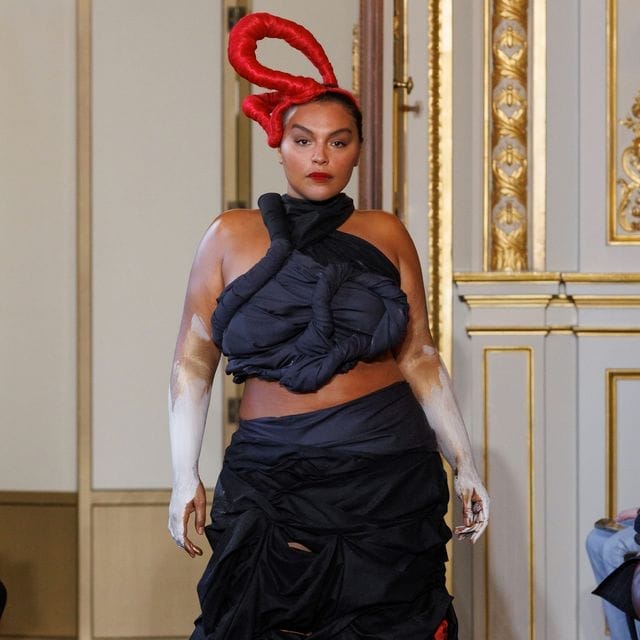
COURTESY OF TORISHÉJU DUMI
It’s always been the case, but it might be even truer today: It’s tough to be an independent fashion designer. With the cost of raw materials and labor rising in the U.S. and across Europe, not to mention the dominance of well-established brands and conglomerates in the luxury and fast-fashion sectors, scaling a retail business on your own is a hustle. It’s especially daunting for women of color, who are often overlooked for lead design roles by the fashion-industry powers that be. And yet, despite the slim odds, the Spring 2024 season offered a window on the tremendous creative power, drive, and vision of three female independent designers who made headlines for their incredible collections: Torishéju Dumi, based in her hometown of London; Karoline Vitto, Brazilian but currently living in London; and Rachel Scott of Diotima, an LVMH Prize finalist who is based in New York by way of Jamaica.

COURTESY OF TORISHÉJU DUMI
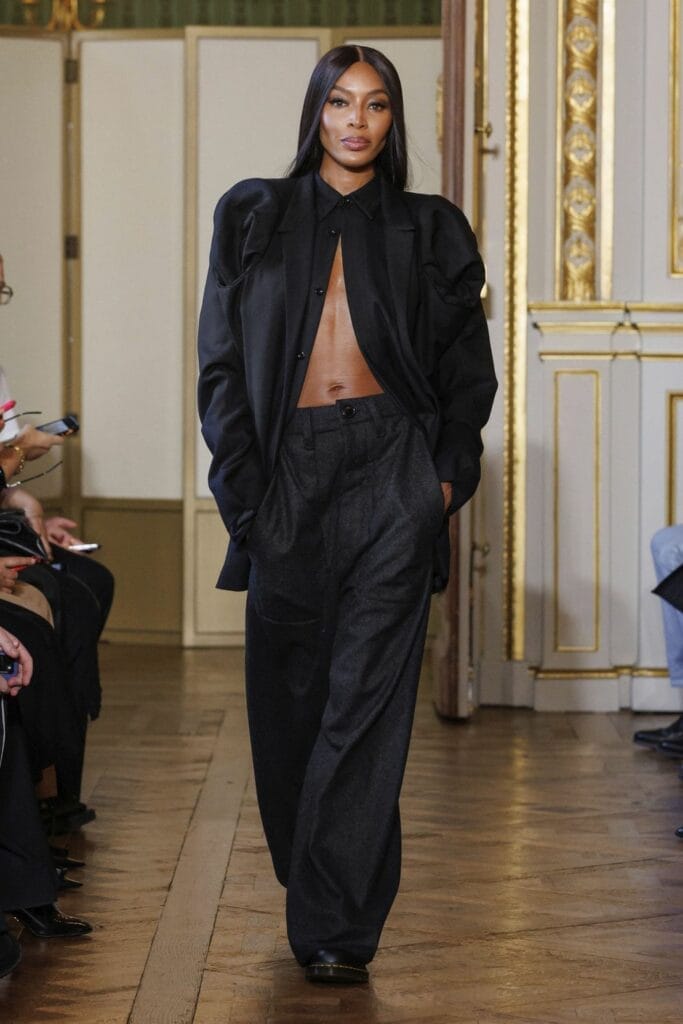
COURTESY OF TORISHÉJU DUMI
Naomi Campbell walking the runway for Torishéju Dumi’s spring 2024 collection in Paris
Torishéju Dumi
Dumi officially launched her line, Torishéju, during Paris Fashion Week in October, showing for the very first time. Debuting her sculptural ready-to-wear at the Shangri-La hotel, her runway show starred the likes of Paloma Elsesser and Naomi Campbell (who, according to Dumi, put her hands in her trouser pockets at her fitting, posed, and said, “Oh, I really like it”) and was styled by Gabriella Karefa-Johnson, someone who has been a mentor of sorts, helping her put the show together along with publicist Lucien Pagès. Dumi made her collection entirely on her own in her Hackney studio flat. She titled it “Fire on the Mountain” after a line from a song, the rest of which goes, “run, run, run,” that her mother used to sing to her whenever they’d cross the street.
Some of her pieces have a monastic quality, inspired by her Catholic upbringing, but all of the clothes, even the more artful, Louise Bourgeois–esque looks, are wearable. Twisted fabric and draped detailing are derived from the traditional wrap clothing worn by those in her family’s native Brazilian and Nigerian cultures. You can clearly see Dumi’s skills in the garments, namely in the strong, thoughtfully off-kilter construction that was likely learned during her time at London’s Central Saint Martins, where she graduated with a focus in menswear. The sharp tailoring is impressive too, done with a technical hand she honed while interning for designers like Ann Demeulemeester and Phoebe Philo, during the Celine years.
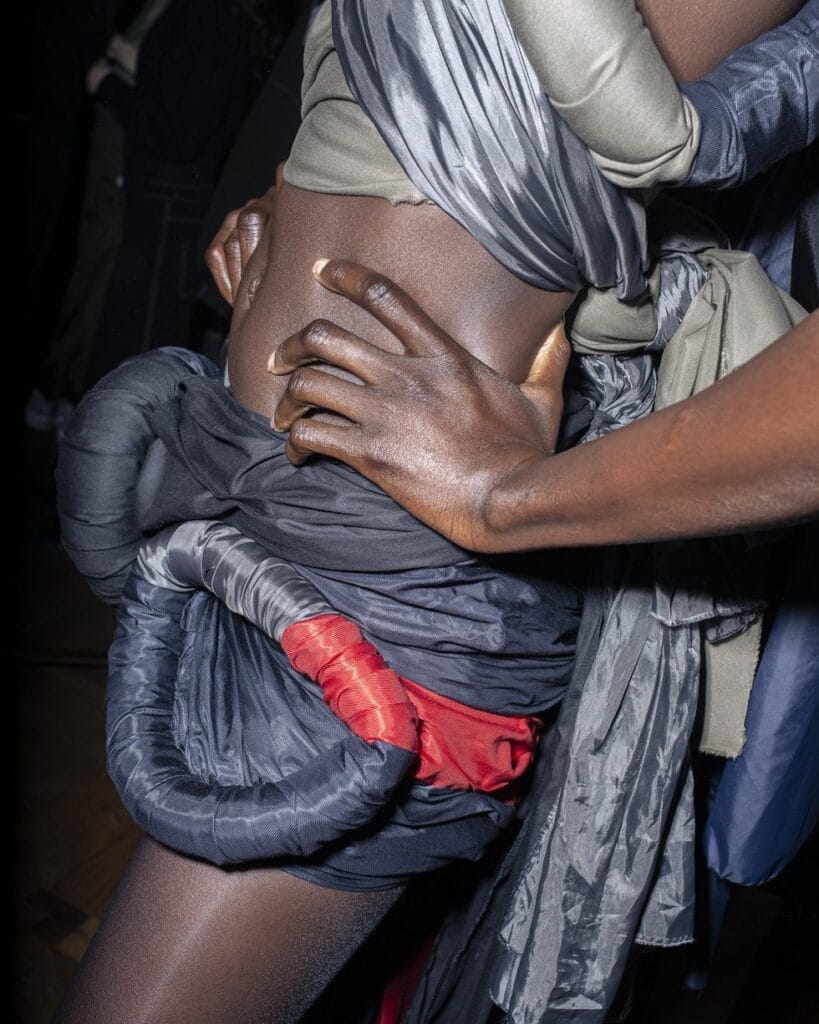
LIAM LESLIE | Backstage details of Dumi’s spring 2024 collection
“I’ve never had very much available to me,” Dumi explains when discussing the growth of her brand. “I think I create better when I’m in a tight box. If I were given all the materials in the world, I don’t think I could create something as thought-provoking.” While her designs are certainly that, Dumi is a rare breed of artist who balances her creativity with pragmatism. “Success happens when preparation meets opportunity,” she says.“Especially nowadays, you can’t just let it unfold organically. I think you have to work for anything you want, and I want this.”
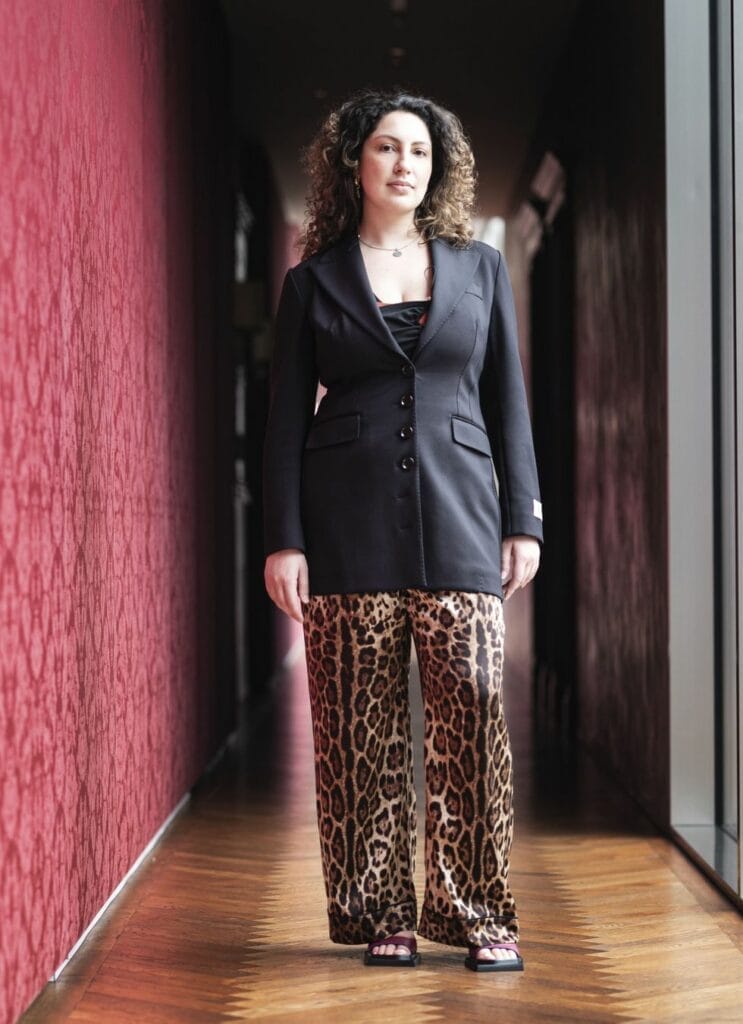
COURTESY OF DOLCE & GABBANA
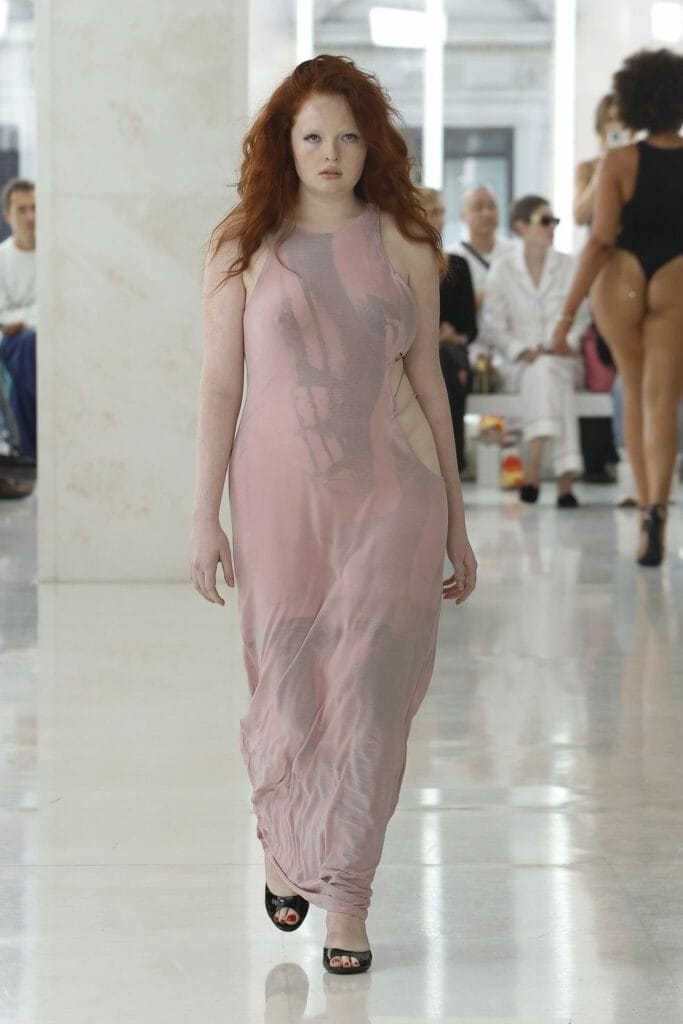
COURTESY OF DOLCE & GABBANA | A look from Vitto’s spring 2024 collection
Karoline Vitto
Such is the case too for Vitto, who showed during Milan Fashion Week and was supported by Dolce & Gabbana via its program that aims to empower young designers through financial backing and mentorship. The designer, who got her master’s from the Royal College of Art in London, launched her namesake label in 2020 and has shown for the past two seasons in London; for Spring 2024, she was invited into the Dolce & Gabbana archives to source vintage fabrics. The resulting body-hugging separates and knitwear feature cutouts, as well as silver hardware embellishments, that enhance the wearer’s natural shape.

COURTESY OF DOLCE & GABBANA
Vitto and a group of models backstage for her spring 2024 show in Milan
Vitto, who currently sells direct to consumers on her website, is focused on building a brand that is authentically size-inclusive; her pieces are available from small up to 4XL. “We started off with the goal of being as representative as possible,” she says. “For me, it was always about trying things on myself and on my friends.” Growing up in Brazil, Vitto often had a hard time seeing curvy women like herself in fashion, especially during a time when there was the rise of local supermodels like Adriana Lima and Gisele Bündchen. “That’s very much not the body type that the average Brazilian woman has,” Vitto notes. “I’ve always had an issue with that.”
As much as Vitto is passionate about addressing representation in fashion, she also wants it to feel natural, not something forced by a “size-inclusive” marketing agenda. “I’m aware this conversation comes as a result of what I do,” she says, “but I don’t think I ever set out to be this hero of body diversity. For me, it’s really about wanting to dress people’s bodies.” In addition, she’s dedicated to building a sustainable brand, figuring out how to expand her line while still using deadstock materials. “We also have the desire to show in Brazil at some point in the next year,” Vitto says.

COURTESY OF DIOTIMA
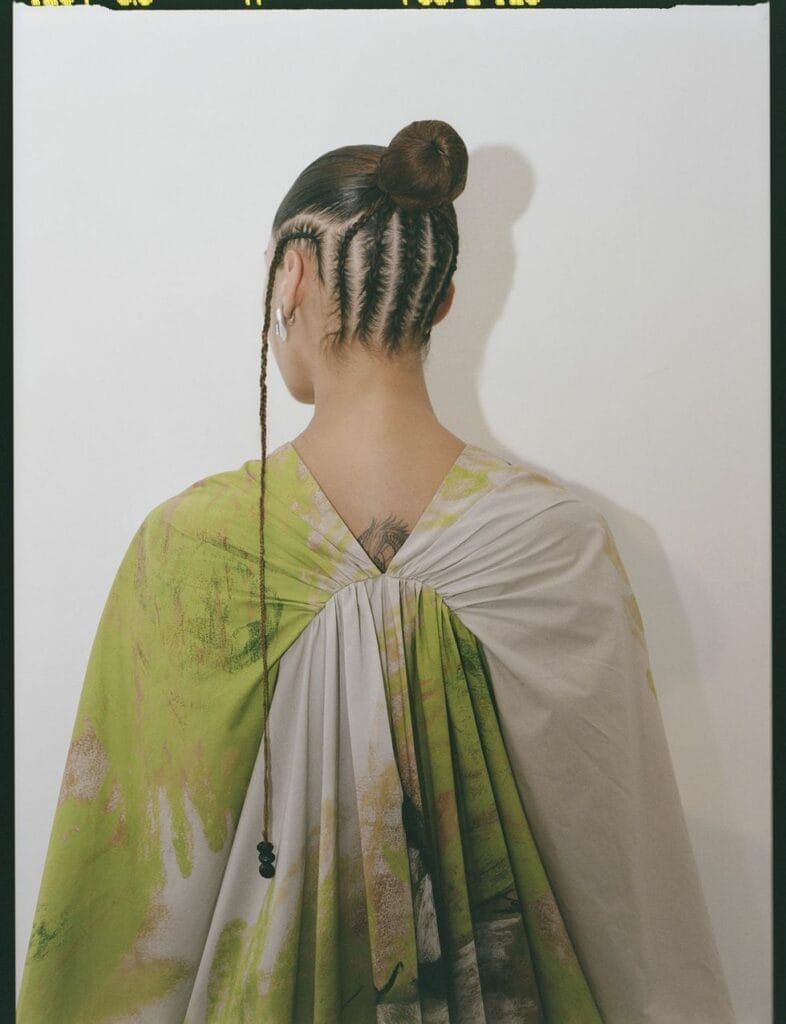
DEIRDRE LEWIS
Details of Diotima’s spring 2024 collection
Rachel Scott
In a system that still operates according to a traditional retail model, upcycling, sizing, and artisanship are all challenging components of a small brand hoping to scale up, but they’re certainly not impossible. Rachel Scott of Diotima is proof that one can achieve commercial success with craft-based clothes. Born and raised in Jamaica, Scott launched her label in New York in 2021 with the intention of giving more space to her culture and its history, as well as to the creativity that was born there and continues to thrive locally. “I knew that this brand needed to be something that would bring awareness to Jamaica and the Caribbean culture at large,” she says. “The style has been referenced in fashion in so many ways throughout history, but it was never in a way that was related to the people living there, and I found that problematic.”
Scott, who came up through Central Saint Martins and New York’s Fashion Institute of Technology, works with local craftswomen in Jamaica who collaborate with her on her spectacularly beautiful doily-inspired crocheted pieces. Her tailoring is loose but distinct, and all of her ready-to-wear is intentionally tactile and sensuous, with elements like embroidery, layering, and macramé.
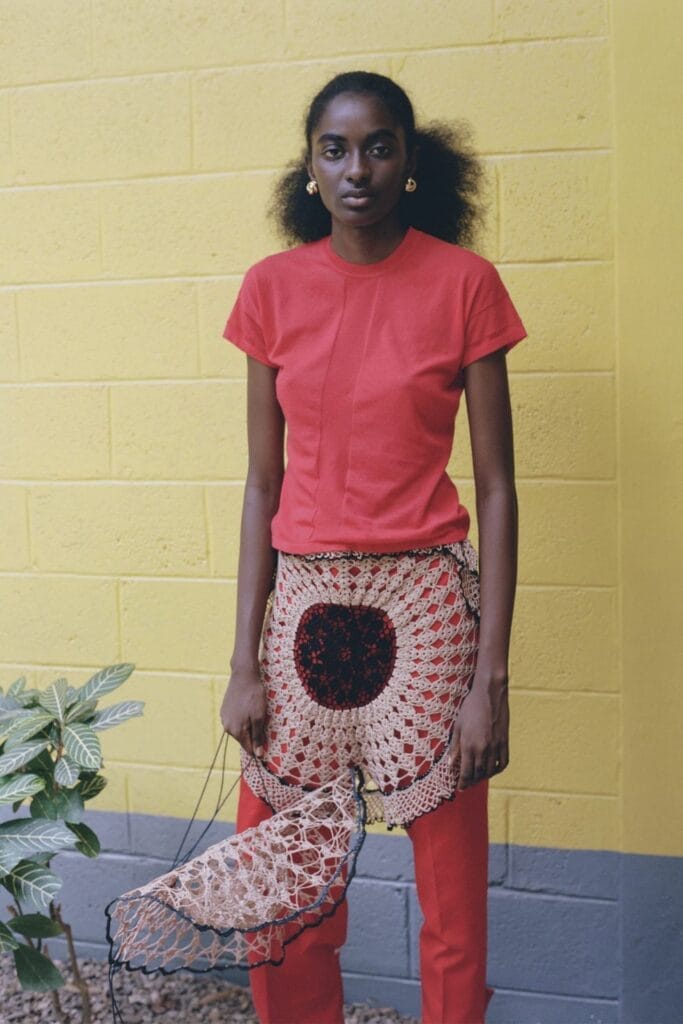
COURTESY OF DIOTIMA
A look from Diotima’s spring 2024 collection
This year, Scott was an LVMH Prize finalist and a runner-up in the CFDA/Vogue Fashion Fund, which awarded her a $100,000 grant. She’s currently stocked at retailers including Bergdorf Goodman and McMullen in Oakland, and she hopes to open a space in her hometown of Kingston that will act as an atelier and, more importantly, serve as an exhibition space for local creatives. Scott also hopes to extend her brand into accessories and build upon the idea that craft is “not an aesthetic but a political choice,” something that should be celebrated and appreciated for its humanity and not just coveted for its quality and price point. Scott is excited about what’s to come in the new year and, as always, the potential to do more. “I’m going to push it,” she says. “I’m going to find a way like I always do, like women always do.”
__________________________________________________
This article first appeared on harpersbazaar.com



